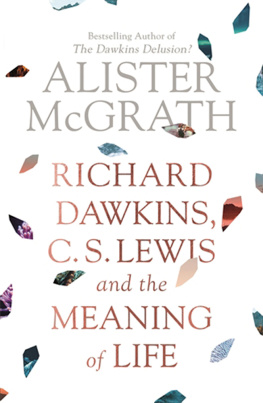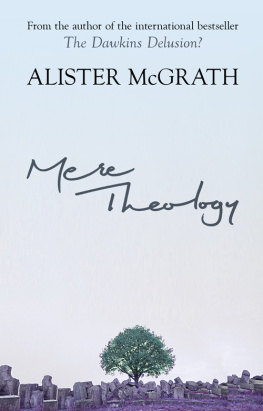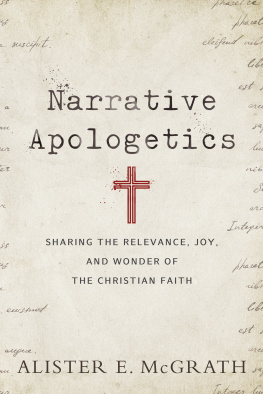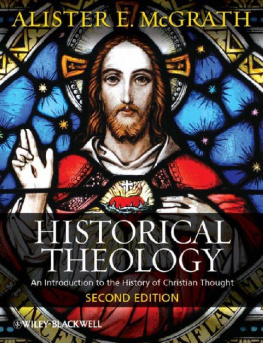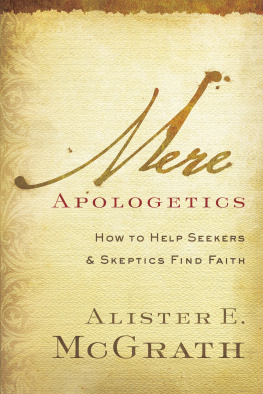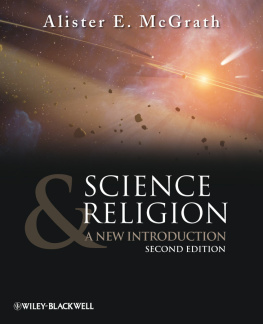Alister McGrath - Richard Dawkins, C.S. Lewis and the Meaning of Life
Here you can read online Alister McGrath - Richard Dawkins, C.S. Lewis and the Meaning of Life full text of the book (entire story) in english for free. Download pdf and epub, get meaning, cover and reviews about this ebook. year: 2019, publisher: SPCK, genre: Religion. Description of the work, (preface) as well as reviews are available. Best literature library LitArk.com created for fans of good reading and offers a wide selection of genres:
Romance novel
Science fiction
Adventure
Detective
Science
History
Home and family
Prose
Art
Politics
Computer
Non-fiction
Religion
Business
Children
Humor
Choose a favorite category and find really read worthwhile books. Enjoy immersion in the world of imagination, feel the emotions of the characters or learn something new for yourself, make an fascinating discovery.
- Book:Richard Dawkins, C.S. Lewis and the Meaning of Life
- Author:
- Publisher:SPCK
- Genre:
- Year:2019
- Rating:4 / 5
- Favourites:Add to favourites
- Your mark:
- 80
- 1
- 2
- 3
- 4
- 5
Richard Dawkins, C.S. Lewis and the Meaning of Life: summary, description and annotation
We offer to read an annotation, description, summary or preface (depends on what the author of the book "Richard Dawkins, C.S. Lewis and the Meaning of Life" wrote himself). If you haven't found the necessary information about the book — write in the comments, we will try to find it.
Alister McGrath has written to great acclaim on both Richard Dawkins and C. S. Lewis. Here he brings these two intriguing and well-known writers into a conversation. They could hardly have more different perspectives! Engaging with their views is a brilliant way of sharpening up our own thinking on the meaning of life.
Richard Dawkins, C.S. Lewis and the Meaning of Life — read online for free the complete book (whole text) full work
Below is the text of the book, divided by pages. System saving the place of the last page read, allows you to conveniently read the book "Richard Dawkins, C.S. Lewis and the Meaning of Life" online for free, without having to search again every time where you left off. Put a bookmark, and you can go to the page where you finished reading at any time.
Font size:
Interval:
Bookmark:

The three books most relevant to the questions raised in this volume are:
Dawkins, Richard, The Blind Watchmaker: Why the Evidence of Evolution Reveals a Universe without Design (New York: W. W. Norton, 1986).
The God Delusion (London: Bantam, 2006).
The Selfish Gene , 2nd edn (Oxford: Oxford University Press, 1989).
Two other works raise questions related to religious issues:
Dawkins, Richard, A Devils Chaplain: Selected Writings (London: Weidenfeld & Nicholson, 2003).
Unweaving the Rainbow: Science, Delusion and the Appetite for Wonder (London: Penguin, 1998).
Works about Richard Dawkins relevant to this volume:
Elsdon-Baker, Fern, The Selfish Genius: How Richard Dawkins Rewrote Darwins Legacy (London: Icon, 2009).
Grafen, Alan and Mark Ridley (eds), Richard Dawkins: How a Scientist Changed the Way We Think (Oxford: Oxford University Press, 2006).
For Dawkinss views on science and faith, see especially:
McGrath, Alister E., Dawkins God: From the Selfish Gene to the God Delusion , 2nd edn (Oxford: Wiley-Blackwell, 2015).
The following are especially relevant to the topics discussed in this volume:
Lewis, C. S., Mere Christianity (London: HarperCollins, 2001).
Surprised by Joy (London: HarperCollins, 2001).
The following essays, included in C. S. Lewis, Essay Collection: Faith, Christianity and the Church , ed. Lesley Walmsley (London: HarperCollins, 2000), should also be noted:
Is theology poetry? (pp. 1021)
The Weight of Glory (pp. 96106)
On Obstinacy in Belief (pp. 20615)
Works about C. S. Lewis relevant to this volume:
McGrath, Alister E., C. S. Lewis A Life: Eccentric Genius, Reluctant Prophet (London: Hodder & Stoughton, 2013).
The Intellectual World of C. S. Lewis (Oxford: Wiley-Blackwell, 2013).
Williams, Rowan D., The Lions World: A Journey into the Heart of Narnia (London: SPCK, 2012).
Aeschliman, Michael D., The Restitution of Man: C. S. Lewis and the Case against Scientism (Grand Rapids, MI: Eerdmans, 1998).
Gasper, Karen and Gerald L. Clore, Attending to the Big Picture: Mood and Global Versus Local Processing of Visual Information, Psychological Science 13:1 (2002), pp. 3440.
Hicks, Joshua A. and Laura A. King, Meaning in Life and Seeing the Big Picture: Positive Affect and Global Focus, Cognition and Emotion 21:7 (2007), pp. 157784.
Kidd, Ian James, Receptivity to Mystery: Cultivation, Loss, and Scientism, European Journal for Philosophy of Religion 4:3 (2012), pp. 5168.
McGrath, Alister E., An Enhanced Vision of Rationality: C. S. Lewis on the Reasonableness of Christian Faith, Theology 116:6 (2013), pp. 41017.
Meilaender, Gilbert, Theology in Stories: C. S. Lewis and the Narrative Quality of Experience, Word and World 1:3 (1981), pp. 22230.
Pigliucci, Massimo, New Atheism and the Scientistic Turn in the Atheism Movement, Midwest Studies in Philosophy 37:1 (2013), pp. 14253.
Sacks, Jonathan, The Great Partnership: God, Science and the Search for Meaning (London: Hodder & Stoughton, 2011).
Tanzella-Nitti, Giuseppe, Religion and Science as Inclinations Toward the Search for Global Meaning, Theology and Science 10:2 (2012), pp. 16778.
Trigg, Roger, Beyond Matter: Why Science Needs Metaphysics (West Conshohocken, PA: Templeton Press, 2015).
Ward, Michael, Science and Religion in the Writings of C. S. Lewis, Science and Christian Belief 25:1 (2013), pp. 316.
Wielenberg, Erik J., God and the Reach of Reason: C. S. Lewis, David Hume, and Bertrand Russell (Cambridge: Cambridge University Press, 2008).
Wolf, Susan R., Meaning in Life (Princeton, NJ: Princeton University Press, 2010).
Sir Peter Medawar (191587), a leading British biologist who championed the public engagement of science, highlighted the importance of transcendence in the human quest for meaning. We long to see ourselves as part of a bigger picture that stretches beyond our immediate needs and concerns. Science is part of that picture but only part: Only humans find their way by a light that illuminates more than the patch of ground they stand on. Human beings seem to be driven to find something deeper than what can be found through an examination of the empirical world. Thats what the human quest for meaning is all about.
Other voices could easily be brought into this conversation. One of the most interesting is that of Albert Einstein, who held that questions of personal meaning and ethical values are beyond the scope of the natural sciences:
... the scientific method can teach us nothing beyond how facts are related to, and conditioned by, each other... knowledge of what is does not open the door directly to what should be . One can have the clearest and most complete knowledge of what is , and yet not be able to deduct from that what should be the goal of our human aspirations.
Both the identity of that goal and the motivation to reach it must come from another source. Einstein was not an orthodox religious believer but was acutely aware of the need to have a deeper vision of reality than that disclosed by the natural sciences. A similar thought was expressed by the Cambridge physicist Alexander Wood, who highlighted the capacity of a religious world view to disclose the intelligibility and coherence of our existence: This is our first demand of religion that it should illumine life and make it a whole.
Its understandable that so many should focus on the question of what is distinctive about human nature, and try to express this scientifically. Yet this sometimes leads us to overlook questions about what human beings seem to need if they are to function properly. What does it mean to be human? Why is there evil and suffering? How do I find truth? What is a good life and how do I lead it? These can be treated as if they are scientific questions, but theyre not. At heart theyre existential questions. Although they may find philosophical answers, they are most naturally framed in terms of religion.
Lets look at a personal history that highlights some of these points. Paul Kalanithi (19772015) was a promising neurosurgeon who died of metastatic lung cancer at the age of 37, before he could ever practise as a fully qualified surgeon. Once he knew he was dying, Kalanithi reflected long and hard on the meaning of life, the importance of the practice of medicine and the place of science in human culture. His bestselling book, When Breath Becomes Air , was written during his final illness and published posthumously.
Kalanithi loved science but found that it failed to engage with some of the questions that both really mattered to him and increased in importance as his illness progressed:
Science may provide the most useful way to organize empirical, reproducible data, but its power to do so is predicated on its inability to grasp the most central aspects of human life: hope, fear, love, hate, beauty, envy, honor, weakness, striving, suffering, virtue.
Literature, however, illuminated experience, providing a way of confronting the messiness and weight of real human life.
Now Kalanithi may not be representative, although the huge impact of his book suggests that his personal story and the ideas that emerged from it resonate with many people. Science, he argues, is not really about explanation but about reducing phenomena into manageable units. By its very nature it cannot engage with the existential, visceral nature of human life, which is unique and subjective. Theres nothing wrong with science; its simply that its answers are important in some areas of life but not in others. To deal with the complexity of life we need more than science.
Font size:
Interval:
Bookmark:
Similar books «Richard Dawkins, C.S. Lewis and the Meaning of Life»
Look at similar books to Richard Dawkins, C.S. Lewis and the Meaning of Life. We have selected literature similar in name and meaning in the hope of providing readers with more options to find new, interesting, not yet read works.
Discussion, reviews of the book Richard Dawkins, C.S. Lewis and the Meaning of Life and just readers' own opinions. Leave your comments, write what you think about the work, its meaning or the main characters. Specify what exactly you liked and what you didn't like, and why you think so.

